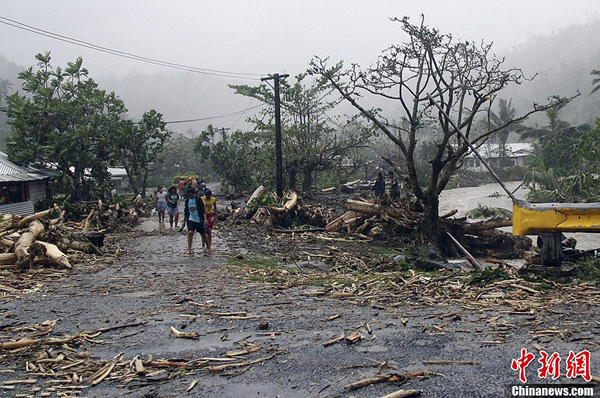UNEP: Climate change undermines development
- By Gong Yingchun
 0 Comment(s)
0 Comment(s) Print
Print E-mail China.org.cn, June 5, 2014
E-mail China.org.cn, June 5, 2014
The issue of climate change including the rise of sea level is undermining the development aspirations of small island developing states (SIDS), said Kaveh Zahedi, UNEP regional director and representative for Asia and the Pacific, during an exclusive interview with China.org.cn ahead of World Environment Day.
|
|
|
People make their way through debris on Dec. 14, 2012 after Cyclone Evan hit Apia, Samoa.?[Photo/Chinanews.com] |
The theme of the 43rd World Environment Day is "Raise your Voice, Not the Sea Level", focusing on the impact of climate change on SIDS.
The world's 52 SIDS, home to 62.3 million people, are custodians of 30 percent of the world's 50 largest exclusive economic zones and play an important role in protecting the oceans. A study said the rise of sea level would reach up to two meters by 2100, enough to swamp many SIDS, including Maldives and Marshall Islands.
"The combined annual carbon dioxide output of SIDS accounts for less than one percent of global emissions," UNEP Executive Director Achim Steiner said. "Yet they are especially vulnerable to the changing climate due to their small size, narrow resource base, susceptibility to natural hazards, low economic resilience, and limited capacity to mitigate and adapt to the effects of climate change," he added.
Moreover, it is not only small islands that are vulnerable, the low-lying river deltas of Bangladesh, India, Vietnam and China; about seven percent of Vietnam's agricultural land and many of the coastal water aquifers of Myanmar are vulnerable to sea level rises, Kaveh Zahedi said.
He pointed out that the people and countries in Asia Pacific region are bearing the economic costs of climate change. In 2011, natural disasters cost the region one billion U.S. dollars in damages. Cyclone Evan, which was considered to be the worst tropical cyclone to affect the island nation of Samoa, resulted in a 0.5 percent contraction in 2013 of the country's economy.
"Progress is being made in the development of the small island states but [it was] undermined," Kaveh Zahedi explained.
"One of the strange things about climate change discussions is that if you look country by country, there is much more action, and there are aggressive policies on climate change. However, at the international negotiation table we still don't have a commitment that will help us meet the 'two-degree target'," he said.
UN Secretary-General Ban Ki-moon will bring together countries from around the world in New York to discuss climate action in September, in the hope of agreeing on an "ambitious commitment."
"I really hope the international community will work on reducing the gap between what countries are offering in international negotiations and what scientists tell us, and find a way to make sure that we don't exceed two degrees," Kaveh Zahedi said.






